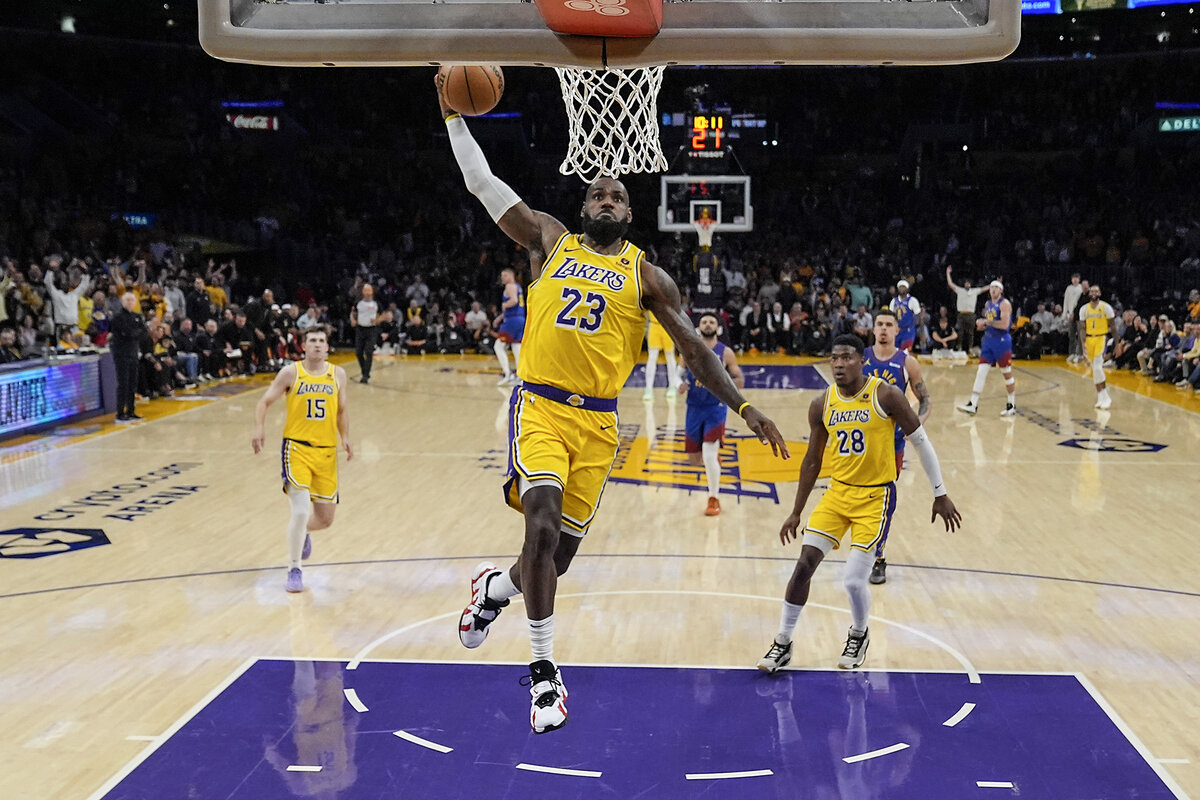NBA playoffs without Curry? James? Durant? A new guard rises in basketball.
Loading...
LeBron James’ basketball career has always been paradoxical with respect to time, whether it was his rise through the NBA ranks as a teenager, or how he remains one of the game’s great players upon the completion of his 21st season.
The way that campaign ended, along with those of some of his peers, represent a stunning changing of the guard. Despite the best efforts of James and the Los Angeles Lakers, they were vanquished by one of James’ admitted understudies, the Denver Nuggets’ Jamal Murray.
Murray hit two game-winners during the course of a first-round, five-game playoff series, which the Nuggets won 4-1. Stephen Curry and Kevin Durant, both generational talents, were similarly taken down by players who looked up to them years ago, specifically, the Sacramento Kings’ De’Aaron Fox and the Minnesota Timberwolves’ Anthony Edwards.
Why We Wrote This
The NBA playoffs without the league’s superstars represents an important reminder in life – when we obsess over the past, we miss out on the greatness that is happening in the present.
For the first time in 15 seasons, the second round of the NBA playoffs will be without the familiar trio of James, Curry, and Durant. Fans of the NBA seem to have great difficulty with letting the past go, but much like in life, I have come to embrace such change.
The morning after Murray’s second game-winner, I received a message from a college buddy who floated the idea of a James-Curry-Durant team-up. “There’s one obvious way to extend this era,” he insisted.
The insistence to maximize the primes of the trio sounded like the musings of fans who clamored for Michael Jordan after his second retirement in 1999. Even now, the legendary standard Jordan set has infringed on the greatness of James, as the two often end up in (inane) debates about who is the “greatest of all time.”
Jordan’s twilight and the downslope of James’ career represent an important reminder in life – when we obsess over the past, we miss out on the greatness that is happening in the present. As a person who studies and appreciates history, I understand this requires great balance. And yet I believe the greatest zen happens when we allow the past to inform the present and future, not overtake it.
Basketball is best when we appreciate the contributions of all of its stars, much like in a free-flowing offense. This allows for a generational perspective that is productive and healing – like the changing of seasons. With respect to Murray’s heroics, the best player on the Nuggets is Nikola Jokić, a native of Serbia whose dominance has become harder and harder to deny over the past few years.
In addition to Jokić, other players vying for the league’s most valuable player are of foreign descent – the Oklahoma City Thunder’s Shai Gilgeous-Alexander, a native of Canada, and Luka Dončić, who is from Slovenia. And the Boston Celtics’ Jayson Tatum has been on the cusp of greatness for close to a decade, himself a wunderkind in the mold of the late, great Kobe Bryant.
Society often talks about legacy, but rarely about lineage. Jordan made way for Bryant and seems to have an heir in Edwards, who wrested his first-round playoff matchup from Kevin Durant and the Phoenix Suns with an unmistakable competitive fire. Poetically enough, it was Durant who teamed with a young Russell Westbrook to overtake Bryant’s Lakers in the 2010s.
As the global games approach this summer, there are other similarities – and opportunities to mold and meld greatness across eras. James, Curry, Durant, Edwards, and Tatum will join a collection of players that will represent the United States at the 2024 Olympic Games. The 1992 roster, better known as the Dream Team, was a coming-out party of sorts for Jordan, who shone amid the end of an era for luminaries such as Magic Johnson and Larry Bird.
Ultimately, pro basketball is a reminder not only of how things change, but also of the duality of what it means to “pass the torch.” It is not always a gracious process, as evidenced by the competitive fires of a generation of greats being extinguished relatively early. And yet, this is the ultimate form of respect to players such as James – imitation being the sincerest form of flattery.
Benevolence doesn’t always manifest itself in the field of play or in the final score, but we have the option to reflect on the good and bad with gratitude. Oftentimes, during various media opportunities, James will wear a shirt that says “More than a game.” This is where sports might be at its greatest – beyond individual and remarkable athletic exploits, and representative of ideals which can help us all.







